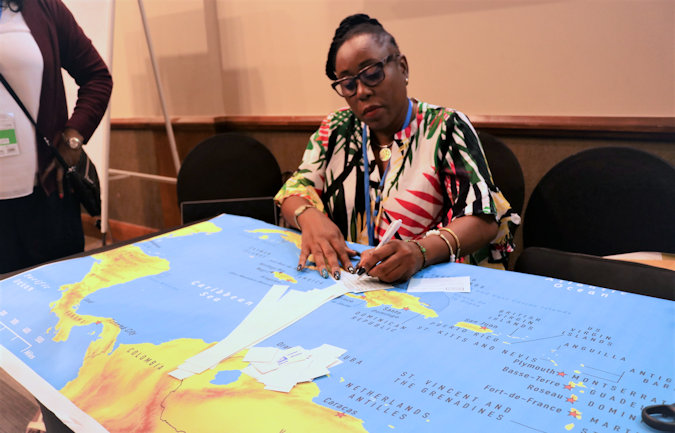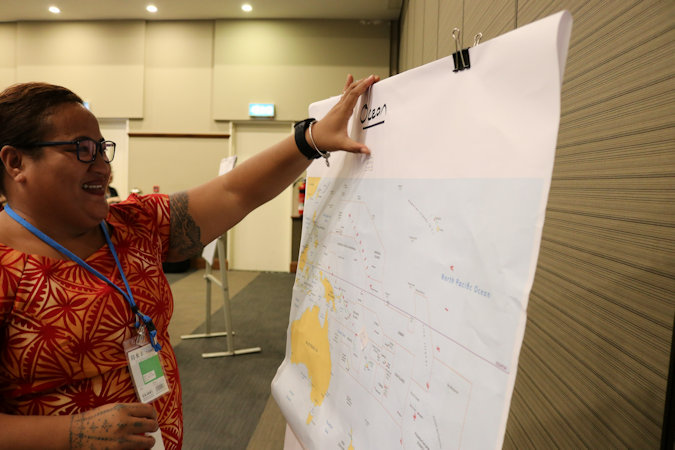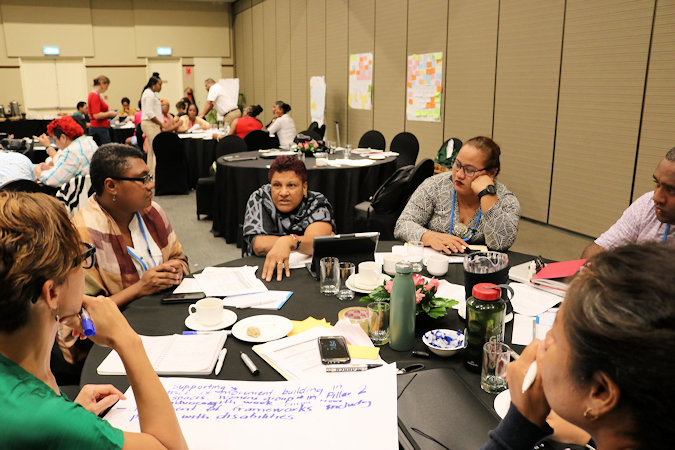Consultation to Shape New Programme on Women’s Resilience to Disasters
Date:
[Press Release]
 A Caribbean participant engaged in the mapping exercise. Photo: UN Women/Sarika Chand
A Caribbean participant engaged in the mapping exercise. Photo: UN Women/Sarika ChandSUVA, Fiji – Recognising the strength and innovation of women, and harnessing existing initiatives through lessons learned in the face of a changing climate and in the aftermath of disasters is vital to women’s resilience building. These were some of the key issues highlighted recently at the first global stakeholder consultation for the Women’s Resilience to Disasters Programme.
The first global stakeholder consultation on the program design brought together over 40 participants across the development and civil society sectors engaged in the resilience space to share experiences from across the Pacific and Caribbean regions. The Caribbean delegation was coordinated by UN Women Caribbean office.
UN Women MCO Caribbean Deputy Representative Tonni Brodber noted: “It is not often that women from the Caribbean and the Pacific SIDS have the opportunity to share experiences and better practices with one another face to face. UN Women is pleased to be able to support this kind of platform through its convening role to ensure that any programme that is developed for communities, is developed by the communities”.
Deborah Fredrick, the President of the women’s farming group from the Kalinago Territory in Dominica, in the Caribbean, draws from her experience of being a health aide in the aftermath of Category 5 Hurricane Maria, in the Caribbean, which devastated Dominica in 2017.
 Participant from the Pacific during the mapping exercise. Photo: UN Women/Sarika Chand
Participant from the Pacific during the mapping exercise. Photo: UN Women/Sarika Chand“I think this programme needs to meet some needs of the psychosocial support system, because even if we - the women, look strong, we’re still mentally and physically affected as we respond to our family and community needs after a disaster,” said Ms Fredrick.
Women in Small Island Developing States like Dominica and in the Pacific are usually first responders in a disaster. Deborah adds there is limited support for those providing support in the aftermath of a disaster, to help their communities, and families, which was essential for building long term resilience in how a community responds to disasters in the future.
The two-day consultation launched a series of actions to map existing work, identify gaps, needs, more key stakeholders and priority areas in women’s resilience building for the Pacific and Caribbean countries. The consultations contributed to program design in both the Caribbean and Pacific regions, as well as to the global component of the program.
“We have a unique opportunity with the Women’s Resilience to Disasters program to address a long-standing gap in the resilience space – the lack of integrating gendered perspectives meaningfully into resilience programming – and demonstrate the value add of UN Women in this area. To create a truly resilient community we have to consider the needs and capacities of different people in our community as they relate to climate change and disasters, ” said UN Women Fiji MCO Deputy Representative, Sarah Boxall.
The consultation saw discussion around how people living with disabilities and other marginalized groups that were usually labelled as ‘vulnerable’, in fact brought strength, capacity and ideas to the work of resilience building, that needs to be considered and integrated into the programme.
 Pacific Disability Forum (PDF) Program Officer for Disability Inclusive Disaster Risk Reduction, Naomi Navoce (Centre), provides feedback to her team during the workshop. Photo: UN Women/Sarika Chand
Pacific Disability Forum (PDF) Program Officer for Disability Inclusive Disaster Risk Reduction, Naomi Navoce (Centre), provides feedback to her team during the workshop. Photo: UN Women/Sarika ChandPacific Disability Forum (PDF) Program Officer for Disability Inclusive Disaster Risk Reduction, Naomi Navoce, who also participated in the consultation, said they were glad to be involved in the process – from the early design stage, which was important for the needs of women with disabilities to be really considered.
“While PDF is doing work in the region, this programme focuses on building women’s resilience so how can we as partners work together to strengthen capacity, so we can empower women with disabilities to be more resilient in DRR?” said Ms Naomi.
The programme, in its inception phase, is supported by the Australian Government. At its core the programme will focus on promoting gender responsive prevention, preparedness and response systems by delivering targeted actions enabling women and girls to increase their resilience to future climate impacts, natural hazards, and better withstand and recover from slow and sudden onset events. Enhanced accountability, generating catalytic action around women’s resilience and production of practical lessons learned for upscaling and replication are all envisioned to be key outcomes of the program.
For further information please visit:
asiapacific.unwomen.org/en/countries/fiji
www.facebook.com/unwomenpacific
www.twitter.com/unwomenpacific
Media enquiries should be directed to:
- Sharon Carter-Burke, Communications Analyst, UN Women Multi-Country Office, Caribbean | Email: sharon.carter-burke@unwomen.org | Tel: +1 246 467 6000 Ext 6124
- Sarika Chand, Media and Communications Specialist, UN Women Fiji Multi-Country Office, Suva, Fiji | Email: sarika.chand@unwomen.org | Tel: +679 9239857
BACKGROUND INFORMATION:
Gender and Protection in Humanitarian Action and Disaster Risk Reduction Programme
In the Pacific, cyclones, floods and droughts are increasing in both intensity and frequency, with devastating impact, especially on women and. In addition, the skills of many Pacific women are often under-utilised in disaster preparedness, response and recovery.
The Gender and Protection in Humanitarian Action programme works to strengthen the capacity of humanitarian actors in the Pacific to integrate gender and protection in their work, and to lead the mainstreaming of gender and protection through the entire humanitarian system at national levels in countries across the Pacific region. Additionally, UN Women aims to strengthen the role of women as key actors in humanitarian action. UN Women provides leadership to the regional Pacific Humanitarian Protection Cluster, bringing together UN agencies, regional and international organisations with local authorities to identify and fulfill the needs of impacted communities.
Women’s and community-based organisations’ contributions are under-utilized in disaster risk reduction (DRR) and resilience-building strategies in Small Island Developing States (SIDS) and to address this gap, UN Women is developing a Global Programme on Strengthening Women’s Resilience to Disasters in Small Island Developing States (Women’s Resilience to Disasters Programme), covering the Pacific and the Caribbean regions as pilots.